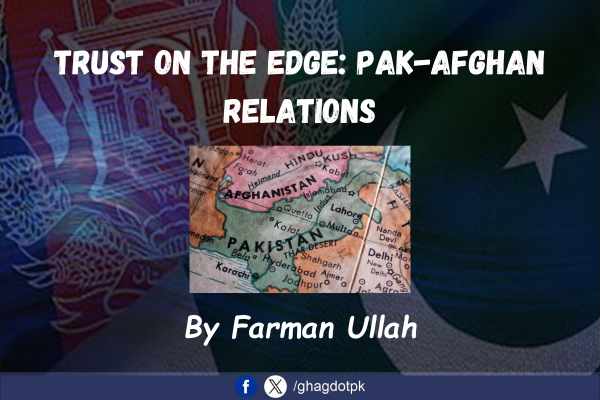By Farman Ullah
The Afghan Ambassador to Pakistan, Sardar Ahmad Shakib, recently emphasized the importance of strong, cooperative relations between Afghanistan and Pakistan, particularly concerning security. Addressing recent tensions, Shakib highlighted Afghanistan’s commitment to not allowing its territory to be used for actions against Pakistan, especially regarding groups like the Tehrik-i-Taliban Pakistan (TTP), which Pakistan views as a significant security threat. The Afghan government has conveyed its intent to curb TTP activities from within its borders, responding to Pakistan’s security concerns.
The relationship between Pakistan and Afghanistan has long been marred by mutual distrust, defined by historical grievances, conflicting interests, and regional security concerns. Despite geographical proximity and cultural ties, this mistrust has hindered collaboration on key issues such as counterterrorism, refugees, border security, and economic development. As both countries confront shared challenges like extremism, trade blockades, and cross-border attacks, a more cooperative approach is crucial. Understanding the roots and impacts of this trust deficit may offer insights into potential pathways toward a more stable and mutually beneficial relationship.
Impacts of the Trust Deficit
The distrust between Pakistan and Afghanistan has far-reaching impacts on regional stability, economic growth, and security. This strained relationship hampers effective counterterrorism efforts, as both countries accuse each other of harboring insurgents that destabilize the region. Cross-border militancy often escalates into violent clashes, undermining security on both sides of the Durand Line. Economically, the lack of trust disrupts trade routes, slowing the flow of goods and resulting in lost revenue and economic strain for both nations, especially for Afghanistan, which depends heavily on Pakistan for access to global markets. Additionally, the distrust affects millions of Afghan refugees in Pakistan, as they often face uncertain status, impacting their livelihoods and fueling further grievances. This mutual suspicion not only divides neighbors but also stalls opportunities for cooperative growth, stability, and prosperity in a region in need of peace and development.
Hindered Counterterrorism Collaboration
The lack of trust has significantly undermined coordinated counterterrorism measures. Joint efforts to tackle the insurgency have often been stymied by mutual accusations, and opportunities for intelligence-sharing and security coordination have been missed. This fragmentation has allowed terrorist networks to operate in the border region, affecting both Afghan and Pakistani civilians and weakening each country’s internal security.
Border and Refugee Issues
The porous and contested border between Pakistan and Afghanistan has been a source of contention and insecurity. Cross-border attacks and smuggling have created frequent flashpoints for violence, leading Pakistan to fence parts of the border. Additionally, Pakistan hosts a large number of Afghan refugees, a legacy of the Soviet invasion. Their presence has become a political and social issue, with both governments sometimes using refugee policies as leverage in diplomatic standoffs.
Economic and Developmental Stagnation
Pakistan and Afghanistan have missed significant opportunities for economic growth and development due to the trust deficit. Instead of benefiting from regional initiatives like the China-Pakistan Economic Corridor (CPEC), which could potentially be extended to Afghanistan, both countries have been unable to leverage regional economic cooperation. The resulting economic stagnation further complicates poverty alleviation and job creation efforts, fueling discontent and providing fertile ground for extremist ideologies.






